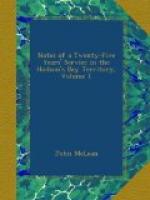Happy change, it may be said; but so say not the Indians; the days of happiness are gone for them, at least for those of the present generation; though I have no doubt that their posterity may, in course of time, become reconciled to, and adopt those habits of life which their altered circumstances may require. A few have done so already, but many of them still remain on the most remote parts of their lauds, having no longer the means of enjoying themselves at their village, or of satisfying the avarice of priests and traders. Here they pursue, without restraint or interruption, the mode of life most congenial to their habits.
I have already observed, that I could discover but little difference between the (so called) Christian Indians, and their unbaptized countrymen, when beyond the surveillance of their priests. They practise all the superstitious rites of their forefathers, and place implicit confidence in the power of magic, although they admit that the same results cannot be obtained now, as formerly, in consequence, as they say, “of the Cross having come in contact with the Medicine.” They have their genii of lakes, rivers, mountains, and forests, to whom they offer sacrifice. I was present at the sacrifice of a beaver, made by an Algonquin to his familiar, or “totem,” in order to propitiate him, because he had been unsuccessful in hunting. The beaver was roasted without being skinned, the fur only being appropriated to the spirit, whilst the flesh afforded a luxurious feast to the sacrificer; and in this part of the ceremony I willingly participated.
When any of them is taken ill, the indisposition is ascribed to the effects of “bad medicine;” and the person is mentioned whom they suspect of having laid the disease upon them. Many violent deeds are committed to revenge these supposed injuries. An Algonquin, who had lost a child, blamed a tete de boule, who was domiciled at Lac de Sable, for his death. The ensuing spring the tete de boule took a fancy to visit the Lake of Two Mountains, and set off in company with the Algonquins.
On arrival of the party at the Grand River, he who had lost his child invited the tete de boule to his tent, and entertained him in the most friendly manner for a time, then suddenly drawing his knife, he plunged it into the side of his unsuspecting guest. The poor wretch fled, and concealed himself in a pig-sty, where his groans soon discovered him to the Algonquin, who, again seizing him, thrust his knife into his throat, and did not withdraw it until he ceased to live.
“Now,” exclaimed his murderer, “I am avenged for the death of my child. You wanted to go to the Lake to be baptized, and here I have baptized you in your own blood.”
Many other instances might be adduced to prove that the savage disposition of these Indians has not been greatly ameliorated by their profession of Christianity; they have, in fact, all the vices with but few of the virtues of their heathen countrymen.




